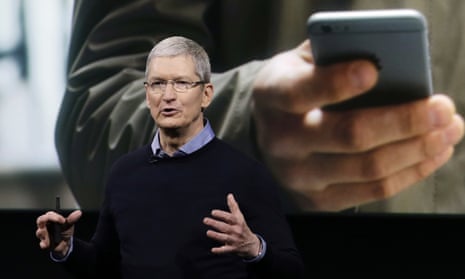Apple’s chief executive, Tim Cook, has attempted to assuage fears over the company’s fall in earnings, saying that the dip in stock price was a “huge overreaction” and that forthcoming iPhones will make people look back and ask “how did I live without this?”
Cook described the 26% year-on-year drop in revenues Apple suffered last quarter and the trouble in China which caused the billionaire investor Carl Icahn to sell his entire stake in the company as “short-term turbulence”.
Talking to Jim Cramer on CNBC’s Mad Money, he said: “What we’re seeing is that people are upgrading at a lower rate than they did last year, but still higher than the year before. So we had this abnormally high upgrade rate last year as people bought into the iPhone 6.”
The iPhone 6 brought with it a change in screen size and design for the flagship smartphone, expanding to 4.7in for the iPhone 6 and 5.5in for the iPhone 6 Plus, Apple’s first smartphone with a screen larger than 4in. But Apple has been accused of failing to offer a compelling reason to upgrade with the 2015 iPhone 6S and 6S Plus.
‘How did I live without this?’
“We have great innovation in the pipeline, like new iPhones that will incent you and other people that have iPhones today to upgrade to new iPhones,” said Cook. “We are going to give you things that you can’t live without, that you just don’t even know you need today. You will look back and wonder: ‘How did I live without this?’”
Cook, who admitted that the company was secretive and “didn’t talk about futures” as some others do, would not be drawn on what the anticipated iPhone 7 would contain. LG recently unveiled a fingerprint scanner that can work through a glass screen, without the need for dedicated button, which has long been expected to be Apple’s end-goal for its Touch ID fingerprint scanner.
Whether that technology, which is expected to appear in phones towards the end of 2016 or the beginning of 2017, will be included in the iPhone 7 is unknown.
Apple has also faced criticism over its Watch, which has failed to meet expectations, despite being the number-one selling smartwatch in the world with 13m sold in 2015, according to research firm IDC, and a further 14m expected this year. Cook was bullish, saying the company was still in “learning mode” and that its goal was to slowly establish the category.
The iPod or iPhone weren’t seen as overnight successes
Cook said: “If you look all the things Apple has done over time, at the time that they were done they are rarely ever seen like they were in retrospect.
“I think the watch will be like that too. If you look at iPod it wasn’t viewed as a success, but today it’s viewed as an overnight success. The iPhone was the same way. People were writing about it not having a physical keyboard, obviously no one would want it.
“In a few years we will look back and people will say, ‘how could I ever have thought about not wearing this watch’, because it will be doing so much for you. Then it will be viewed as an overnight success.”
Cook also addressed concerns that the iPhone had finished its growth and that it was entering a plateau, saying that what is seen in the US is not representative of the rest of the world.
“Eventually everyone in the world will have a smartphone, but penetration is around 40% so there is a long way to go. In the short term, the iPhone upgrade rate affects all countries, including China. But the switcher rate is up to nearly 40%.
“What that says is that the market doesn’t need to be growing hugely for Apple to grow. If we can get switchers we can grow.”
